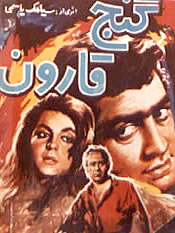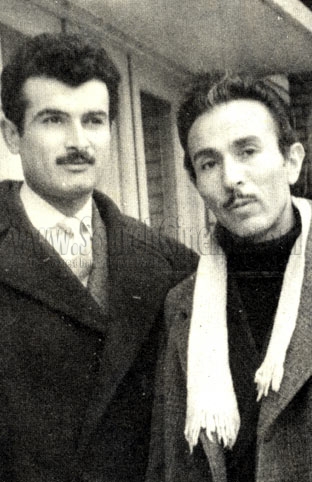|
Joseph Vaezian
Joseph Vaezian ( hy, Ժոզէֆ Վաէզեան; fa, ژوزف واعظیان) was an Iranian Armenian film producer and director. Biography Vaezian was born in 1918 in the city of Kermanshah. He was a businessman before turning to cinema. Having an interest in art, he co-founded, with Aramais Aghamalian, Arman, and Samuel Khachikian Samuel Khachikian ( hy, Սամուէլ Խաչիկեան ; fa, ساموئل خاچیکیان; October 21, 1923 – October 22, 2001) was an Iranian film director, screenwriter, author, and film editor of Armenian descent. He was one of the most ..., the Armenian Troup Theater in 1947. Ten years later he set up «Azhir Film Studio» with Khachikian and Shahrokh Rafie and started a new career as film producer. ''Storm in Our Town'' (Khachikian, 1958), produced by him and Rafi'e, was the first of 15 films he produced up to 1967. In the mid 1960s, he left Azhir Film to try his hands in other capacities, and wrote and directed ''The Wandering Man'' (19 ... [...More Info...] [...Related Items...] OR: [Wikipedia] [Google] [Baidu] |
Kermanshah
Kermanshah ( fa, کرمانشاه, Kermânšâh ), also known as Kermashan (; romanized: Kirmaşan), is the capital of Kermanshah Province, located from Tehran in the western part of Iran. According to the 2016 census, its population is 946,681 (2021 estimate 1,047,000). A majority of the people of Kermanshah are bilingual in Southern Kurdish and Persian, and the city is the largest Kurdish-speaking city in Iran. Kermanshah has a moderate and mountainous climate.روزنامه سلام کرمانشاه Persian (Kurdish)آشنایی با فرهنگ و نژاد استان کرمانشاه (Persian) [...More Info...] [...Related Items...] OR: [Wikipedia] [Google] [Baidu] |
Iran
Iran, officially the Islamic Republic of Iran, and also called Persia, is a country located in Western Asia. It is bordered by Iraq and Turkey to the west, by Azerbaijan and Armenia to the northwest, by the Caspian Sea and Turkmenistan to the north, by Afghanistan and Pakistan to the east, and by the Gulf of Oman and the Persian Gulf to the south. It covers an area of , making it the 17th-largest country. Iran has a population of 86 million, making it the 17th-most populous country in the world, and the second-largest in the Middle East. Its largest cities, in descending order, are the capital Tehran, Mashhad, Isfahan, Karaj, Shiraz, and Tabriz. The country is home to one of the world's oldest civilizations, beginning with the formation of the Elamite kingdoms in the fourth millennium BC. It was first unified by the Medes, an ancient Iranian people, in the seventh century BC, and reached its territorial height in the sixth century BC, when Cyrus the Gr ... [...More Info...] [...Related Items...] OR: [Wikipedia] [Google] [Baidu] |
Iranian Armenian
Iranian-Armenians ( hy, իրանահայեր ''iranahayer''), also known as Persian-Armenians ( hy, պարսկահայեր ''parskahayer''), are Iranians of Armenian ethnicity who may speak Armenian as their first language. Estimates of their number in Iran range from 70,000 to 200,000. Areas with a high concentration of them include Tabriz, Tehran, Salmas and Isfahan's Jolfa (Nor Jugha) quarter. Armenians have lived for millennia in the territory that forms modern-day Iran. Many of the oldest Armenian churches, monasteries, and chapels are located within modern-day Iran. Iranian Armenia, which includes modern-day Armenian Republic was part of Qajar Iran up to 1828. Iran had one of the largest populations of Armenians in the world alongside neighboring Ottoman Empire until the beginning of the 20th century. Armenians were influential and active in the modernization of Iran during the 19th and 20th centuries. After the Iranian Revolution, many Armenians emigrated to Armen ... [...More Info...] [...Related Items...] OR: [Wikipedia] [Google] [Baidu] |
Film Producer
A film producer is a person who oversees film production. Either employed by a production company or working independently, producers plan and coordinate various aspects of film production, such as selecting the script, coordinating writing, directing, editing, and arranging financing. The producer is responsible for finding and selecting promising material for development. Unless the film is based on an existing script, the producer hires a screenwriter and oversees the script's development. These activities culminate with the pitch, led by the producer, to secure the financial backing that enables production to begin. If all succeeds, the project is " greenlighted". The producer also supervises the pre-production, principal photography and post-production stages of filmmaking. A producer is also responsible for hiring a director for the film, as well as other key crew members. Whereas the director makes the creative decisions during the production, the producer typicall ... [...More Info...] [...Related Items...] OR: [Wikipedia] [Google] [Baidu] |
Film Director
A film director controls a film's artistic and dramatic aspects and visualizes the screenplay (or script) while guiding the film crew and actors in the fulfilment of that vision. The director has a key role in choosing the cast members, production design and all the creative aspects of filmmaking. The film director gives direction to the cast and crew and creates an overall vision through which a film eventually becomes realized or noticed. Directors need to be able to mediate differences in creative visions and stay within the budget. There are many pathways to becoming a film director. Some film directors started as screenwriters, cinematographers, producers, film editors or actors. Other film directors have attended a film school. Directors use different approaches. Some outline a general plotline and let the actors improvise dialogue, while others control every aspect and demand that the actors and crew follow instructions precisely. Some directors also write thei ... [...More Info...] [...Related Items...] OR: [Wikipedia] [Google] [Baidu] |
Aramais Aghamalian
Aramais Aghamalian ( hy, Արամայիս Աղամալեան, 1910 – 1985) was an Armenian-Iranian Film director and Screenwriter. Biography Aghamalian was born in 1910 in Julfa. He emigrated with his family to Iran after the massacre of Armenians. They settled in Tabriz , but after his elementary school, Aramais went back to Yerevan , where he attended a painting school for four years. On His graduation in 1927, he began to work as decorator, and after three years he went to Germany to follow his studies at the Berlin College of Dramatic Arts, which he had to quit due to financial problems. In 1934 returned to Iran and settled in Isfahan for five years, and later in Tabriz from 1939 to 1945. When in Tabriz, he directed many plays on stage and translated a number of Russian plays into Armenian. In 1946 he moved to Tehran Tehran (; fa, تهران ) is the largest city in Tehran Province and the capital of Iran. With a population of around 9 million in the city and ... [...More Info...] [...Related Items...] OR: [Wikipedia] [Google] [Baidu] |
Arman (actor)
Aramais Vardani Hovsepian ( Armenian: Արամայիս Վարդանի Հովսեփյան), known as Arman Hovsepian ( fa, آرمان هوسپیان; February 21, 1921 – August 18, 1980) was an Iranian Armenian actor. Biography He was born Aramais Vardan Hovsepian ( hy, Արամայիս Վարդան Յովսէփեան; fa, آرامائیس وارطان هُوسپیان), on 21 February 1921 in Tabriz. He started performing in school theaters before he landed a major role in ''Namus'' in 1940 and entered nonprofessional theater. He moved to Tehran in 1954 and joined the theater group of ''Ararat Club'' and worked with celebrities like Joseph Vaezian, Samuel Khachikian, and Aramais Aghamalian Aramais Aghamalian ( hy, Արամայիս Աղամալեան, 1910 – 1985) was an Armenian-Iranian Film director and Screenwriter. Biography Aghamalian was born in 1910 in Julfa. He emigrated with his family to Iran after the massacre of Ar .... He made his first screen debut ... [...More Info...] [...Related Items...] OR: [Wikipedia] [Google] [Baidu] |
Samuel Khachikian
Samuel Khachikian ( hy, Սամուէլ Խաչիկեան ; fa, ساموئل خاچیکیان; October 21, 1923 – October 22, 2001) was an Iranian film director, screenwriter, author, and film editor of Armenian descent. He was one of the most influential figures of Iranian cinema and was nicknamed "Iran's Hitchcock". Biography Born 1923 in Tabriz to a family of Armenian immigrants. Khachikian's father escaped the Armenian genocide in 1915 and settled in Tabriz. His mother admired cinema and the arts and often took her children to the theater. Samuel Khachikian published his first poem "The Prison" in the Armenian newspaper Alik when he was nine. Five years later, he gave his first stage performance in Tabriz in a play titled "Seville". He completed his education in History and Journalism, and wrote eight plays which went on stage not only in different cities of Iran, but also in Los Angeles, San Francisco and Greece. Khachikian made his first film in 1953, titled ''Return'' ... [...More Info...] [...Related Items...] OR: [Wikipedia] [Google] [Baidu] |
Iranian Film Directors
* Indo-Iranian languages
* Irani (other)
* List ...
Iranian may refer to: * Iran, a sovereign state * Iranian peoples, the speakers of the Iranian languages. The term Iranic peoples is also used for this term to distinguish the pan ethnic term from Iranian, used for the people of Iran * Iranian languages, a branch of the Indo-Iranian languages * Iranian diaspora, Iranian people living outside Iran * Iranian architecture, architecture of Iran and parts of the rest of West Asia * Iranian foods, list of Iranian foods and dishes * Iranian.com, also known as ''The Iranian'' and ''The Iranian Times'' See also * Persian (other) * Iranians (other) * Languages of Iran * Ethnicities in Iran * Demographics of Iran Demography () is the statistical study of populations, especially human beings. Demographic analysis examines and measures the dimensions and dynamics of populations; it can cover whole societies or groups defined by criteria such as edu ... [...More Info...] [...Related Items...] OR: [Wikipedia] [Google] [Baidu] |
Persian-language Film Directors
Persian (), also known by its endonym Farsi (, ', ), is a Western Iranian language belonging to the Iranian branch of the Indo-Iranian subdivision of the Indo-European languages. Persian is a pluricentric language predominantly spoken and used officially within Iran, Afghanistan, and Tajikistan in three mutually intelligible standard varieties, namely Iranian Persian (officially known as ''Persian''), Dari Persian (officially known as ''Dari'' since 1964) and Tajiki Persian (officially known as ''Tajik'' since 1999).Siddikzoda, S. "Tajik Language: Farsi or not Farsi?" in ''Media Insight Central Asia #27'', August 2002. It is also spoken natively in the Tajik variety by a significant population within Uzbekistan, as well as within other regions with a Persianate history in the cultural sphere of Greater Iran. It is written officially within Iran and Afghanistan in the Persian alphabet, a derivation of the Arabic script, and within Tajikistan in the Tajik alphabet, a d ... [...More Info...] [...Related Items...] OR: [Wikipedia] [Google] [Baidu] |
People From Kermanshah
A person ( : people) is a being that has certain capacities or attributes such as reason, morality, consciousness or self-consciousness, and being a part of a culturally established form of social relations such as kinship, ownership of property, or legal responsibility. The defining features of personhood and, consequently, what makes a person count as a person, differ widely among cultures and contexts. In addition to the question of personhood, of what makes a being count as a person to begin with, there are further questions about personal identity and self: both about what makes any particular person that particular person instead of another, and about what makes a person at one time the same person as they were or will be at another time despite any intervening changes. The plural form " people" is often used to refer to an entire nation or ethnic group (as in "a people"), and this was the original meaning of the word; it subsequently acquired its use as a plural f ... [...More Info...] [...Related Items...] OR: [Wikipedia] [Google] [Baidu] |

.jpg)




_1938.jpg)